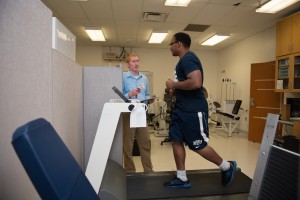
Two topics often come up when someone speaks to athletic trainers and nutritional experts: protein and exercise routines.
The confusion about exercise and nutrition is understandable. People often get conflicting ideologies when researching proper exercise and nutrition.
According to a report from Vestcom International, a marketing company that deals in shelf products for retailers, the dietary supplement market surpassed $30 billion in 2011, and 85 percent of Americans “indicate they are confident in the safety, quality and effectiveness of dietary supplements.”
Many people don’t understand the effects of supplements, let alone their effectiveness. Genevieve Pierce, 22, an Orem native and former consultant at Women’s Services, noticed that women were coming in feeling tired after protein loading.
“They would feel fatigued and weren’t performing as well,” Pierce said. “If you’re doing a heavy cardiovascular activity, you need about 55 percent carbohydrates in your diet.”
Muscle recovery involves replenishing the supply of carbohydrates in the muscle, and BYU’s specialty drink is a great way to do just that.
“Drink chocolate milk. It’s actually good,” said Liza MacDonald, co-director and health coach at Y Be Fit. “But like everything else, you kind of want to compensate, and if there’s a goal of losing weight, you need to recognize how many calories (are) involved.”
According to Travis Masterson, director of training and assessments at Y Be Fit, whey as a supplement is ok, but the myth comes into play with how much protein someone actually needs to consume.
“People are way over on protein. Your body can only process so much protein, and then it takes that protein and converts it into fat,” Masterson said. “Your daily recommendation of protein is 0.8 grams per kilogram of body weight.”
People are often confused by the difference of pounds to kilograms, and advertisements sometimes say exercisers should be eating two grams of protein per pound of body weight.
“So people end up eating four times as much protein as they should, which really just translates to them getting fat,” Masterson said.
While people may or may not consume protein supplements, they may also struggle in terms of the types and intensity of their workouts.
It isn’t necessarily true that people should be in the gym for an hour or more if they’re really dedicated to “being fit.” The amount of time they spend in the gym depends on their fitness goals.
For example, if they’re looking to build muscle, they might be in the gym longer. If exercising for purely health benefits, they don’t need to be in the gym for longer than 20 minutes.
“For health (benefits), all you need to do is work out two days a week. You need to do eight to ten full-body exercises, and you need to do 10–12 reps at a moderate pace…one set per exercise,” Masterson said.
However, people should be careful about falling into a routine with the same muscle exercises. The one thing that Scott Slater, a head trainer at Gold’s Gym in Provo, sees people doing most is getting into a set routine that they go through for months. They often come to him wondering why they don’t see any results.
“Your body adapts to workout programs every seven to 10 days, so you need to change it up somehow,” Slater said. “There are tons of ways to vary your exercise, so if you’re not doing something different, you’re totally (doing it) wrong.”
Working only certain muscles can cause muscle deficiencies, which is when one muscle is worked out more than another. People often have issues in their backs, legs and knees because of these deficiencies and think that the cause of pain is because they are out of shape. That’s what Ron Hager, a BYU professor who studies functional fitness for chronic pain management, has said is a common misconception among people with these issues.
“What’s one of the first things they think they should do? They say, ‘I just need to work out. I need to lift some weights,'” Hager said. “In reality, that kind of an attitude is just going to put strength on top of dysfunction. In other words, you have to address the underlying cause of the pain.”
That means that if people feel pain during any exercise, they need to stop and figure out what the problem is. They could be adding to the injury.
Misperceptions about proper exercise and nutrition will likely continue to be propagated. People should research from a variety of sources and be cautious when taking advice in terms of exercising and dietary guidelines.




